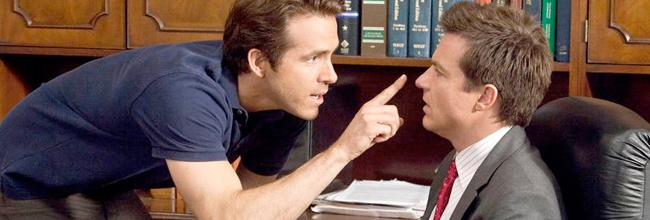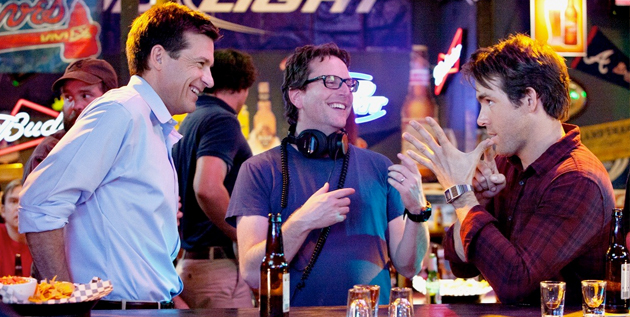
With The Change-Up coming out today, it cements that this has been the return of R-rated summer comedies. Bridesmaids and Horrible Bosses have been great successes, and I’m confident The Change-Up will follow in that path. A few years ago director David Dobkin was also a part of summer where R-rated comedies dominated the season, with his hit comedy Wedding Crashers, next to Judd Apatow‘s 40 Year Old Virgin.
Dobkin is no stranger to high-concept comedies and studio filmmaking. But that is not where the director started off. Dobkin studied at NYU, where he found the film program not very helpful, and then later went on to work for Ridley and Tony Scott; not a bad way to start your career off. With his fun debut film Clay Pigeons getting some attention, he followed it up a few years later by jumping into the studio world, with Shanghai Knights. Since then, he hasn’t had to “lie, cheat, and steal” to get movies made.
Here’s what director David Dobkin had to say about our same unfulfilling high school, the problems with NYU film school, the evolution of his career, and the real emotion he strives for in his work. Check it out below.
DD: Yes. How are you?
I’m good. How you doing, sir?
I’m good, man.
I’m actually calling from Bethesda, Maryland.
I was going to say as I was dialing 301, I was recognizing the area code, obviously.
You also went to Walt Whitman High School.
I did. Did you go to Whitman?
I did.
No way, dude! [laughs] When did you graduate?
[Laughs] A few years ago. Did you dislike it as much as I did?
Yeah, I didn’t really like it. At all [Laughs]. I’m sure we can blame a certain amount of it on being high school, right? You know, when I went the program just did not get my imagination. Maybe it’s the age I was at, but I had a lot more fun at college.
What college did you go to?
I went to NYU, and that I liked a lot. The professors were really amazing.
Did you go to film school there?
I did for two years. I went to an under-grad program there for two years, then transferred into the film school.
Most directors I talk to say they didn’t enjoy film school too much. Was that the case for you?
I actually liked NYU, but I did not like the film school. I thought the writing program was not very good, actually. I went into film school as a writer, and it steered me off from writing for many years because I couldn’t connect with the program.
Why is that?
Well, I had a teacher who taught us wrong about how to write screenplays. Certainly he taught us the traditional form in how you call the shots and the cuts, which may have influenced me in becoming a director. It definitely was not helping me in how to go out in the world and do stuff.
Is there anything from film school that you recall that has became important to your process?
Oh, there’s a lot. Everything that has to do with cinematography — actually, the cinemas study part of the program was really excellent; watching movies, talking about movies, and understanding peoples’ decision making. The acting program at NYU is amazing, and that part of it I got a lot out of. The way I work with actors comes from that program. Also, the basics of the 180-degree line, where to place the camera, what the intentions are behind it, and a lot of that stuff. There’s editing, too. You really do get a chance to cut things together and learn. The basic programs were good and the acting programs were really great.
You mentioned you went to NYU for writing, so what made you switch to director?
Again, the writing program just didn’t work for me. It wasn’t really teaching me the things that I think people should know about writing. The other great mystery to me was performance, and I was around a lot of young actors. I was curious, so I directed some theater and took some acting courses. I’m not someone that likes to be in front of a camera, so I naturally moved behind the camera.
What didn’t they teach you about writing that you think is important?
First of all, I think you need to understand character arcs. You have to understand plot and structure. I didn’t know there was a three act structure until after I graduated, so information was definitely not being put in front of me in a way that was sticking. When I look back, I got a lot out of NYU. I think I was just frustrated because I wasn’t able to do what I went in to do. In the long run, it taught me a lot of important tools.
Did you have a hard time finding jobs after film school? Or did coming from NYU help at all?
No, finding work is always hard. Film school, especially NYU, does not set you up to get into the real world of earning money, what it means, and what the different opportunities are. My experience in film school was you have to do whatever you have to do to get your movie made. You have to lie, cheat, and steal to do it, and that became a reality when I understood production and that the rest of the film world is the same way. It was not a part they identity in the program, but the experience did replicate what the business was going to be, so I got that out of it too.
 Do you still find yourself lying, cheating, and stealing to make movies?
Do you still find yourself lying, cheating, and stealing to make movies?
Absolutely! No… [laughs] Actually, I find myself not having to do much of that anymore, which is good. If you want to get things made in the industry early on, you’re going to be — and I don’t mean that in a literal sense — doing everything possible to get your movie made, and that’s what “lying, cheating, and stealing” means to me. As soon as you think you’ve reached the top of the mountain, there’s more mountains. You better get into that mentality, because it’s a nonstop barrage of obstacles. Between you and your vision, success comes down to achieving those obstacles.
With “lying, cheating, and stealing,” do you miss that type of filmmaking at all? Some directors say that that type of work ethic forces you to be creative.
Man, I like low-budget filmmaking way more than big-budget filmmaking. The larger budgets I’ve had were never going towards the creative, so that was always a bit of a thing. Part of the joy in low-budget filmmaking is the freedom, and that is one of the things you gain from doing that kind of thing. There is creativity there. Sometimes you’re given a little sand in your sandbox, and you find a really cool way how to use it. I’ve always loved this interview with Akira Kurosawa — and I think it was about Ran — and they were asking him about why he framed a shot a certain way, and they thought it was so smart how he did it.
He said there was an airport off the highway to the right [laughs], and I always thought that was an awesome example of what it means to be a director. Sometimes you think, with big movies, you have all the money in the world, but you don’t. You’re trying to think about how you can bring it on the screen and about making smart decisions that will creatively end up being the story. There’s always little stories about everything behind the movie.
I actually really enjoy your debut film, Clay Pigeons. How did that project come about?
Thank you, man. It was a script that was brought to me by my agent. I read it while I was working at Ridley Scott‘s production company. I was a commercial director for a couple of years and I really liked the script. I got attached to it and brought it to Ridley and Tony Scott, and they liked it as well. They got behind me and produced it. That ended up being my first movie. At the time, it was a radical cast to put in that type of film, and nobody really knew any of those actors. It was an amazing group, and it was a lot of fun. It was super low-budget, we shot in a short amount of time, but that was one of my best experiences as a director.
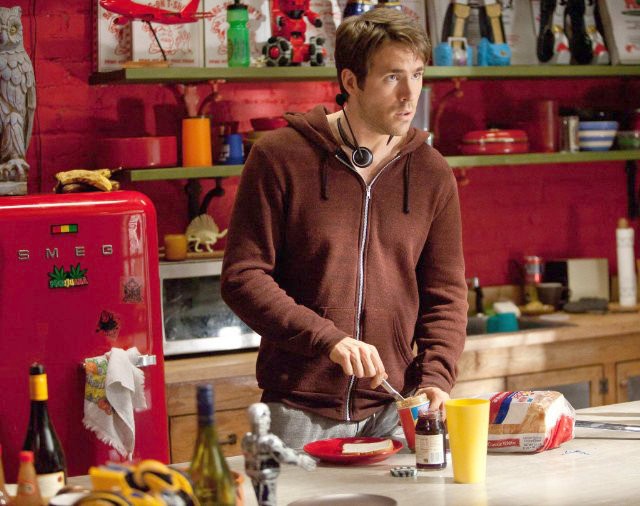 A lot of commercial directors really get noticed from Ridley and Tony’s company. Was working for them a good launch pad?
A lot of commercial directors really get noticed from Ridley and Tony’s company. Was working for them a good launch pad?
Oh yeah, without a doubt. It was weird being in their company being really the only comedy director there, but they were incredibly supportive. They had a lot to do with the launching of my career. To this day, they still have the best director run environment that I’ve been a part of. They really know how to do it, and they got good taste.
Did Clay Pigeons help you get noticed as well?
So many actors and movie executives have always cited that movie, and in the industry it was a nice entrée. Ultimately, it was dark in a way that people weren’t sure whether I could make a commercial movie. It took me a long time to get a commercial film. The guys over at Spyglass Entertainment took a chance and let me do Shanghai Knights.
How was the experience of jumping into studio filmmaking?
It was very comfortable. Again, even though it was a much bigger movie, it was all about making miraculous things happen for the money. It was not a very big budget for that movie. It was fun, though. I had a great time with Owen [Wilson] and Jackie [Chan].
I’d guess that movie had a sizable budget, though.
Yeah, it was $50 million. It was really, really inexpensive. It was about $18 or $19 million below the line, and it was kinda nuts. No two locations repeat themselves in the movie, so all those kinds of things factor into making something way more expensive. We just did it by a shoestring, but we still somehow put the scale on the screen.
You don’t really see comedies getting made at $50 million anymore.
I think that movie is considered as more of an action-comedy, though.
Is it tough to get a budget like that for a comedy?
Yeah, but I don’t think you should be making comedies over $50 million dollars. I don’t see why you need to, unless you have some event being put on-screen. Like, Night at the Museum. You have millions to invest in visual effects and it’s a whole large scale type of entertainment, and that’ll get you there [to that budget].
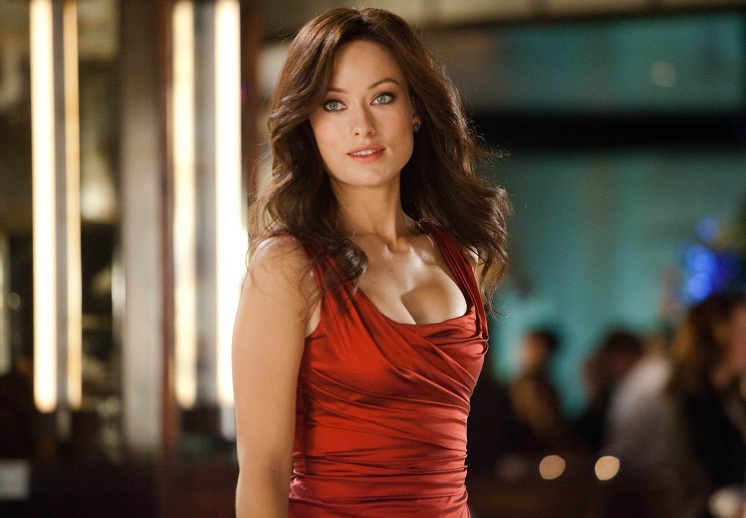 Wasn’t Fred Claus a pretty big-budget comedy?
Wasn’t Fred Claus a pretty big-budget comedy?
It was a big budget, and too big of a budget. The movie cost too much money. It was a really fun movie to make, but we had to create a whole other world. Unfortunately, there’s different things you put money into. I think that movie’s concept overshot the budget of it. As far as creating the north pole and satisfying that whole part of the story, it was very challenging.
With you directing it and that concept, I thought it was odd that it was a PG movie.
We wanted to go PG-13 with it, and it would’ve been an incredibly funnier movie. I know some fans who find it incredibly sweet and think that it has a good vibe to it, but as a comedy, I feel it was lacking. In the long run, I think the PG rating put us in a difficult position. It was not a great decision.
You mentioned the sweetness and good vibe to Fred Claus, and that seems to be something you go for in all your comedies. With the third act of The Change-Up, you go for real emotions.
I always want everything grounded. Look, the tone sometimes is sophisticated in its own broadness. I really do want to tell stories about real people. I want there to be emotions by the end, and that’s just what I like from movies. The last three comedies I’ve done have been high-concept, and that weighs on the comedy a bit more. As far as the tone, if you’re switching bodies or going to the north pole, the tone bends a little bigger than, say, Wedding Crashers. If you pay your money to see a comedy, then it should be funny as hell. That’s the number one job of a comedy.
If you’re also able to tell a story, make something that moves you, or interests you no matter how simplistic it may be, that’s a plus. I think great movies should aspire to do [both]. Not all movies are going to be great, but you’re trying to make them great. To leave emotion out of a film means you’re not reaching very far, at least in the kinds of movies I make. There’s movies that don’t need to, that are brilliant, like Austin Powers. I don’t know how to do that, though. I need to direct the actors like it’s a drama, and the comedy comes out of the situations.
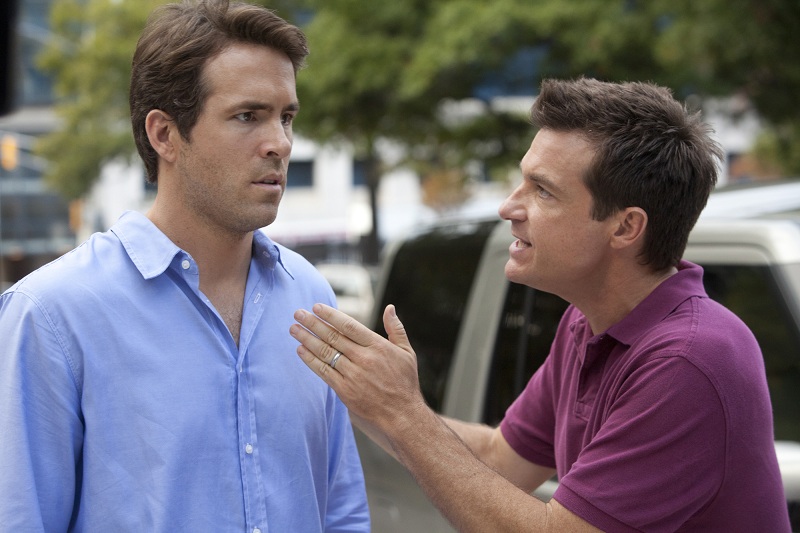 I’m surprised by your experience on Fred Claus, especially since it was after Wedding Crashers. That was obviously a big hit, so didn’t that give you a little clout?
I’m surprised by your experience on Fred Claus, especially since it was after Wedding Crashers. That was obviously a big hit, so didn’t that give you a little clout?
You would think so, but not really [laughs]. I’ll tell you this: all my movies, good or bad, swing for the fences. I really don’t believe in not taking risks. The Change-Up is fucking out of its mind. The script was crazy, and it made me laugh my ass off. As you get into directing, you think, “wow, we’re actually going to do this today!” [laughs] The thing that’s exciting is you’re taking a risk. It may go over the edges here and there, but that’s a part of the ride.
R-rated comedies are about breaking the sound barrier. If you’re not going to study where the edges are in a comedy, then you’re boring. Some things are going to fall over the edge and some things will end up working, but ultimately, who wants to go over the same roller coaster over and over again? You should try to push it a little further, and that’s what I love about R-rated comedies.
[Laughs] I like that you mentioned how crazy the movie is. I love that, by the end of the movie, Olivia Wilde’s character is only interested in Mitch because of his looks.
Exactly, dude. See, you just got it. It’s a post-feminist, punk rock comedy. It’s about men and women on the other side of that movement, and where we’ve all ended up. It is broad and the fact that no one has caught onto it — there is a commentary from a comedic standpoint about how ridiculous it’s all gotten. Men are afraid to be men and are trying to hold it down. Women are trying to be women, but are frustrated. Women these days are either homemakers or punk rockers [laughs].
The Change-Up is now in wide release.


